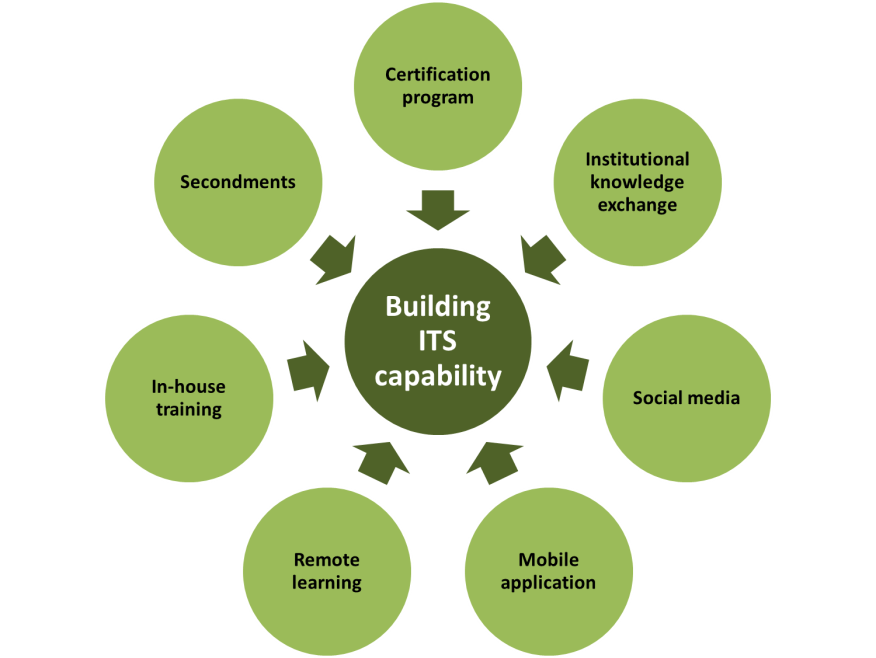
Road Network Operations
& Intelligent Transport Systems
A guide for practitioners!

Road Network Operations
& Intelligent Transport Systems
A guide for practitioners!
A variety of training methods are available for transport professionals who wish to learn more about ITS – which make use of different training mediums. They include remote learning, training secondments, in-house training, internet-based mobile applications, social media, institutional knowledge exchange, and certificate programmes. Different training mediums suit different people.

Internet learning opens up significant opportunities for people to acquire knowledge in ITS necessary for their new professional duties. On-line courses and training provide an opportunity to develop skills in ITS planning, development, implementation and maintenance. Institutions where ITS professionals are employed can make a worthwhile investment into building their ITS capacities using remote learning. An example is the Consortium for ITS Training and Education (CITE) in the USA which provides five types of interactive web-based courses – as outlined in the display box below.
On-line educational programmes may cover core subjects – such as knowledge of ITS-based operations. The depth and breadth of teaching vary according to the level of expertise required – from entry-level technicians to graduate-educated professionals and managers. At all levels, participants need to understand how to interact with their peers and co-workers at different levels – and the part that each plays in the wider system.
The Consortium for ITS Training and Education (CITE)
CITE is an organisation with members from universities and industries. It is focused on providing flexible, convenient, and comprehensive advanced transport training and education for its users in academia (faculty members and students) and industry (such as managers, planners, engineers and technicians). CITE offers five types of interactive web-based courses.
Independent Study
Independent study courses allow participating students to register and take any course whenever they choose – with no set time frame to start or complete the course.
Blended courses
Blended courses combine the features of instructor-led training and on-line instructional training. It includes live discussions with an instructor through conference calls, interaction with other students, convenient on-line course materials, and a specific time frame to complete the course.
Certificates
CITE has bundled its courses into topic areas to provide students with four different certificate programs: ITS Project Management, ITS Systems, Road Weather Management, and Traffic Engineering & Operations. Participants need to complete six courses within one year.
Full Semester Program
CITE has bundled several individual courses together to develop two full semester programs of study. They are offered in the fall and spring semesters just like a college/university course.
Courses in Spanish
CITE has converted several courses into Spanish in response to the increasing demand for ITS training from Latin-American professionals.
After successfully completing their CITE courses, participants receive Continuing Education Units (CEU’s) from the University of Maryland. With the approval of CITE’s university partners, these courses may count towards a specific college degree.
Another example is the USDOT-sponsored Talking Technology and Transportation (T3) Webinars that are designed to help agencies to develop a skill set to solve challenges associated with ITS technology deployment and explore new opportunities. Its activities are outlined in the display box below.
USDOT Talking Transportation Technology Webinars
These free webinars are 90 minute, interactive online meetings that offer opportunities for knowledge sharing in ITS planning, design, procurement, deployment, and operations. The goal of this programme is to increase the capacity of ITS professionals in different institutions – by learning from each other’s experience in ITS.
Certification programmes in ITS can be developed at academic institutions or through partnerships between academic institutions and industry. An example is the University of California’s Intelligent Transportation Systems certificate programme – which is jointly sponsored by three departments: Civil and Environmental Engineering, Electrical Engineering, and Computer Science and Mechanical Engineering. Its activities are outlined in the display box below.
University of California Berkeley ITS Certificate Program
The University of California’s Intelligent Transportation Systems certificate provides formal recognition to students that achieve a basic understanding and expertise in ITS. It is designed to help students to study ITS in a systematic and focused way while they are at the university. Students are required to complete two core courses:
A student seeking a certificate in ITS is also required to take three courses from different departments (civil engineering, electrical and electronics engineering, mechanical engineering, computer science and industrial engineering and operations research). Two courses must be from outside the student’s home department.
The Consortium for ITS Training and Education (CITE) is an organisation with members from universities and industries,It also offers on-line certification programmes and courses in different areas of ITS.